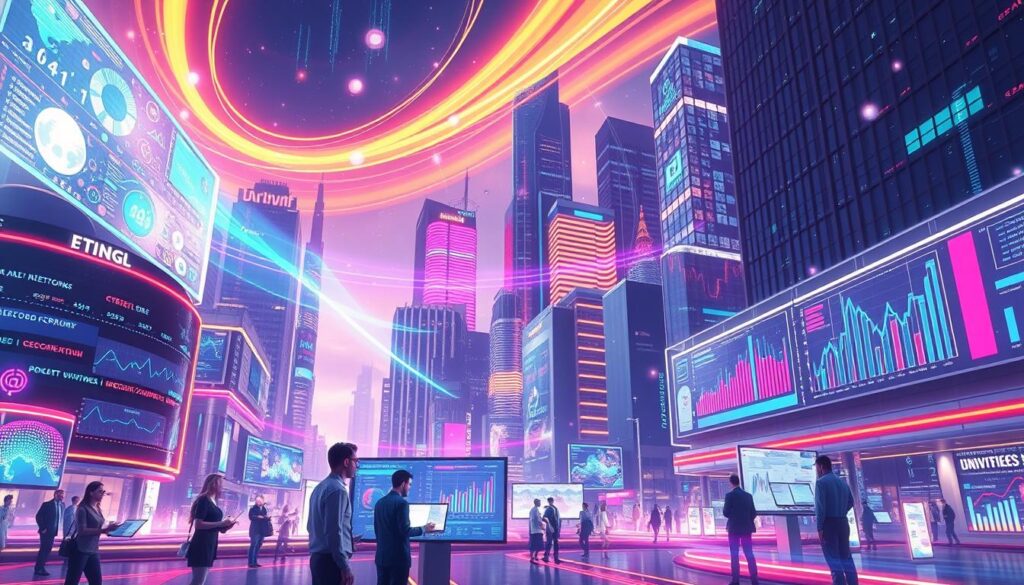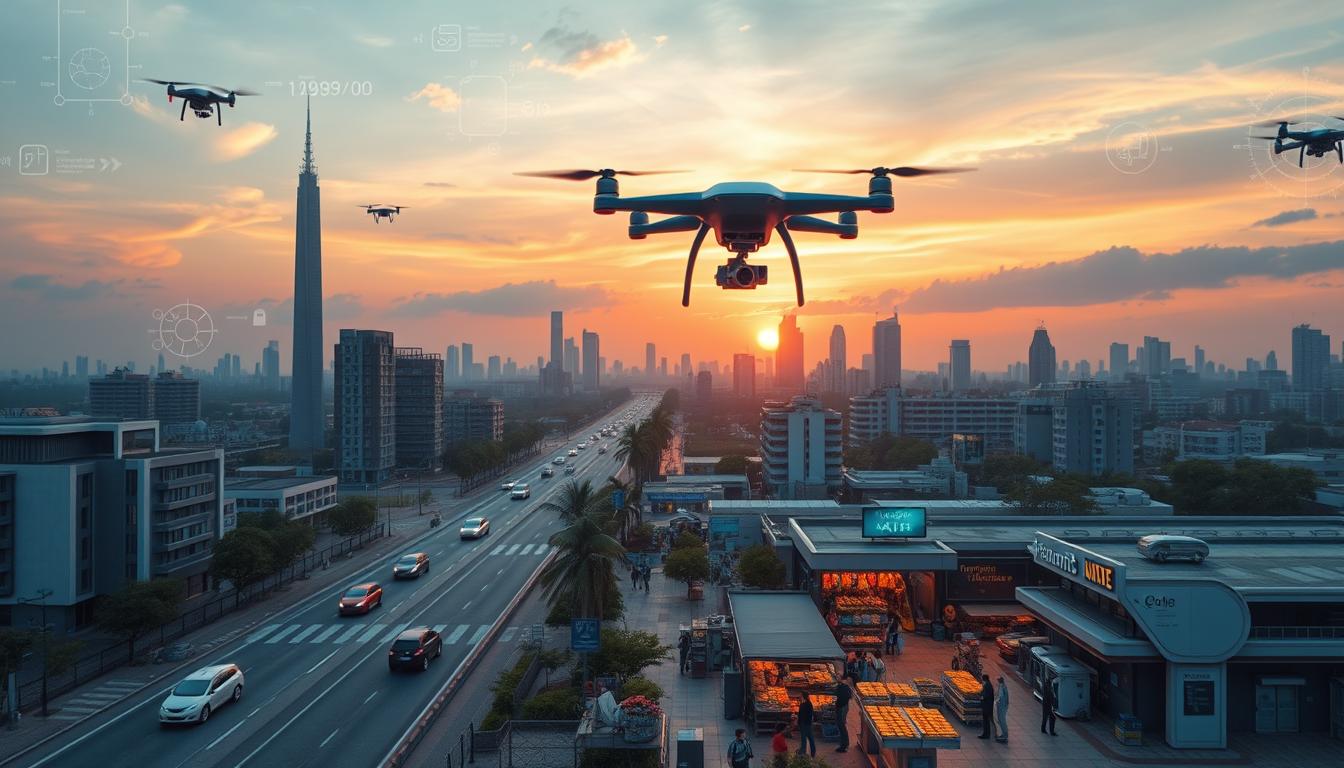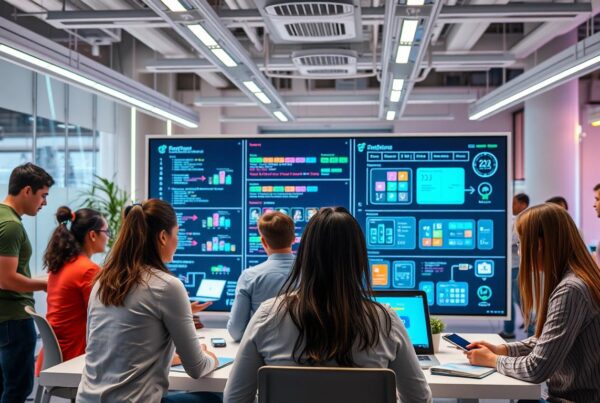In today’s fast-changing world, artificial intelligence (AI) is making a big difference. It’s changing how we live, work, and talk to each other. This article will show you how AI is making our lives better, from virtual assistants to image recognition.
We’ll look at how AI is shaping our future. It’s about understanding and appreciating the AI-driven world we’re moving into.
Key Takeaways
- Discover the practical applications of AI that are transforming our daily lives
- Understand how AI virtual assistants simplify our tasks and improve productivity
- Explore the role of AI in revolutionizing visual analysis and enhancing medical diagnostics
- Learn how AI-powered natural language processing bridges communication gaps and improves customer service
- Gain insights into how AI predictive analytics and robotic process automation are driving data-driven decisions and streamlining workflows
Introduction to AI and Its Growing Presence
In today’s fast-changing digital world, artificial intelligence (AI) is a game-changer. It’s set to change many parts of our lives. Understanding AI’s core and its growing power is key.
What is Artificial Intelligence?
Artificial intelligence means making computers do things that humans do, like solving problems and understanding language. AI uses smart algorithms and data to learn and get better. It can even do things smarter than humans in many areas.
AI’s Rapid Advancement and Potential
AI is getting better fast because of better computers and more data. It’s now used in many fields, like healthcare and finance. This changes how we use technology and solve big problems.
AI’s future is huge. It can make tasks easier, help us make better choices, and give us custom experiences. As AI keeps improving, we’ll see even more amazing uses. It will make our lives more efficient and exciting.
“Artificial intelligence is the future, not the past.” – Tony Stark, CEO of Stark Industries
AI Virtual Assistants: Simplifying Our Daily Lives
Technology has made huge leaps forward, especially with AI virtual assistants and AI personal assistants. These smart systems, powered by artificial intelligence, are now a big part of our daily lives. They make tasks easier and help us work more efficiently.
Virtual assistants like Siri, Alexa, and Google Assistant can understand us in our own words. They answer our questions and do many things for us. They help with everything from reminders to controlling our smart homes.
AI virtual assistants are very flexible. They can find lots of information quickly. This means they can give us accurate answers on many topics, from the weather to the latest news. They make our lives easier and help us save time for more important things.
- Seamless integration with smart home devices, enabling voice-controlled automation
- Personalized recommendations and suggestions based on user preferences and behaviors
- Efficient scheduling and task management, helping us stay organized and productive
- Multilingual support, breaking down language barriers and promoting accessibility
As AI virtual assistants get better, they do more for us. They learn what we like and need. This makes them key in our digital lives, making things simpler and helping us do more.
“AI virtual assistants are revolutionizing the way we approach daily tasks, freeing up our time and mental energy to focus on what truly matters.”
AI Image Recognition: Revolutionizing Visual Analysis
AI is making big strides, especially in image recognition. Now, AI can look at pictures and understand them very well. This is changing many fields in exciting ways.
Applications in Security and Surveillance
In security and surveillance, AI is a big leap forward. It can spot dangers fast, track odd movements, and even know faces well. AI makes security better and helps respond quickly to threats.
Enhancing Medical Diagnostics
In healthcare, AI is also making a big difference. It can look at medical images like X-rays and MRI scans very accurately. This helps doctors make better choices, find diseases early, and improve care for patients.
AI image recognition is changing how we see and understand the world. It’s helping in security and medicine. As AI gets better, we’ll see even more amazing uses in the future.
How AI is Changing Everyday Life: Real-World Applications You Should Know
Artificial intelligence (AI) is changing our lives in big ways. It’s not just a future idea anymore. It’s making our homes smarter and helping us make better financial choices. Let’s look at some examples of how AI is changing our daily lives.
Smart Home Automation
AI is making our homes more efficient and easy to use. Devices like Alexa and Google Home can do lots of things. They can turn on lights, adjust the temperature, remind us of things, and play music.
These devices learn what we like over time. They make our homes better fit our needs.
Financial Insights and Wealth Management
AI is changing how we handle money. It gives us personalized advice and helps manage our wealth. Robo-advisors use AI to analyze lots of data and give us advice on how to manage our money.
| AI Application | Impact on Everyday Life |
|---|---|
| Smart Home Automation | Improved energy efficiency, convenience, and personalization in our living spaces |
| AI-Powered Financial Insights | Simplified wealth management and better-informed financial decision-making |
| AI-Driven Personal Assistants | Increased productivity, organization, and task-completion in our daily routines |
AI is making our lives better by making tasks easier. It’s improving our quality of life. As AI keeps getting better, we’ll see even more changes in how we live and work.
AI Natural Language Processing: Bridging the Communication Gap
Artificial Intelligence (AI) has changed how we talk to technology. Natural language processing (NLP) lets machines understand and speak like humans. This tech is making customer service and language translation better with smart chatbots.
Improving Customer Service and Chatbots
AI chatbots, with NLP, are key in customer service today. They talk like people, answering questions fast. They get what you mean, giving you help that’s just right for you.
This makes talking to companies better and helps humans do harder tasks. It makes customer service smoother and more personal.
Enabling Language Translation and Accessibility
NLP also helps translate languages, making the world more open. It turns words from one language to another, helping people talk across borders. This is great for businesses and people who want to understand things in their own language.
“AI-powered natural language processing is transforming the way we communicate and interact with technology, paving the way for more efficient customer service and improved language accessibility.”
As NLP gets better, we’ll see new ways to talk to machines. From smart chatbots to easy language translation, NLP’s power is clear. It’s changing how we live and work together.
AI Predictive Analytics: Driving Data-Driven Decisions
In today’s world, AI predictive analytics is changing how we make decisions. It uses big data and smart algorithms to find important insights and predict trends. This tech is helping many industries make better choices, helping everyone to deal with today’s challenges.
AI predictive analytics is great at finding patterns and oddities in huge data sets. This helps businesses stay ahead by predicting market shifts and improving their operations. It’s used for many things, like guessing what customers will want next or when equipment might break down.
This technology also makes decision-making more data-driven than ever. It gives leaders the exact forecasts and advice they need for smart choices. It’s changing how we tackle problems in finance, supply chains, and healthcare, among others.

As more people use AI predictive analytics, we’ll see even more amazing uses. It will help in marketing, making things more personal, and more. By using AI predictive analytics, everyone can get ahead in our fast-changing, data-rich world.
AI Robotic Process Automation: Streamlining Workflows
In the world of digital change, AI-powered robotic process automation (RPA) is changing how companies manage work. It automates tasks that take a lot of time, making work faster and better in many fields. This tech helps make work flow better and lets people do more creative and important tasks.
Automating Repetitive Tasks
AI robotic process automation is great at automating tasks that need to be done over and over. It can handle things like data entry, document processing, and even customer service. This means people can focus on solving harder problems and making decisions.
Enhancing Productivity and Efficiency
Adding AI task automation to work processes has made things better for companies. RPA works all the time, doing tasks faster than people can. This means companies can do more and respond to changes quicker. Also, AI productivity tools like RPA make things run smoother, helping businesses do better.
| Benefit | Impact |
|---|---|
| Automation of Repetitive Tasks | Reduced risk of human error, consistent execution, and freed-up human resources |
| Increased Productivity and Efficiency | Higher output, faster response to market changes, and optimized resource allocation |
As companies use more AI robotic process automation, they see big improvements. Work flows better, and things get done faster. This tech is changing the future of work, helping businesses succeed in the digital world.
AI Smart Home Devices: Transforming Our Living Spaces
AI-powered smart home devices have changed how we live and interact with our homes. They include voice-controlled assistants and automated systems. These technologies make our homes more convenient and efficient.
Voice-Controlled Assistants and Home Automation
AI voice assistants like Amazon’s Alexa and Google Assistant are everywhere in homes today. They let us do many things, from setting reminders to controlling lights and security. Just by speaking, we can automate parts of our daily lives.
AI home automation systems do even more. They adjust lights, temperature, and appliances based on what we like and when we want it. This makes our homes more personalized and energy-saving.
| AI Smart Home Device | Key Features |
|---|---|
| Amazon Echo Dot | Voice-controlled smart speaker, plays music, controls smart home devices |
| Google Nest Hub | Voice and touch-controlled smart display, manages smart home devices, displays information |
| Samsung SmartThings | Integrated home automation system, controls various smart home devices |
As AI smart home tech gets better, our homes are getting smarter and more personal. We can control things with our voice and enjoy a home that fits our needs perfectly. These new solutions are changing how we live and interact with our homes.

“The home of the future will be one where every device is connected and responsive to our needs, creating a seamless, automated, and intelligent living experience.”
AI in Healthcare: Revolutionizing Patient Care
The healthcare industry is leading the way in AI adoption. AI is changing patient care in many ways. It’s improving disease diagnosis, treatment, and medical research, making a big difference.
Improving Diagnosis and Treatment
AI is making disease diagnosis more accurate and quick. It looks through lots of medical data to find patterns. This helps doctors diagnose diseases earlier and more accurately.
With AI, treatments are becoming more effective and tailored to each patient. This is a big step forward in healthcare.
Advancing Medical Research and Drug Discovery
AI is also speeding up medical research and drug discovery. It analyzes data and simulates biological processes. This helps researchers find new drug targets and design molecules faster.
AI could lead to quicker development of life-saving drugs. This means patients could get new treatments sooner.
AI is changing patient care in many ways. It’s improving diagnosis, treatment, and research. As AI gets better, we’ll see even more progress in healthcare, helping patients more.
“The integration of AI in healthcare has the potential to transform the entire industry, from enhancing diagnostic accuracy to accelerating medical breakthroughs.”
Ethical Considerations and Challenges of AI
AI technologies are becoming more common, and we must tackle the ethical issues they bring. It’s important to develop AI responsibly. This way, these technologies can help society.
Privacy is a big concern with AI. These systems collect a lot of personal data. We need to know how this data is protected and used.
AI can also show biases, either in the data or the algorithms. It’s important to fix these biases to avoid making things worse. Testing and checking AI models can help.
AI’s impact on society is another issue. It might take jobs away, affecting work and people’s lives. We need to plan carefully to help everyone.
To make AI work for everyone, we need to work together. Policymakers, industry leaders, and the public must join forces. By doing this, we can make sure AI is fair, open, and accountable.
“The greatest challenge with AI is to ensure that it is developed and used in a way that benefits humanity as a whole.”
Conclusion: Embracing the AI-Driven Future
We are on the edge of an exciting future, driven by AI. Virtual assistants make our lives easier, and AI in healthcare is changing patient care. These technologies are making a big difference.
We need to welcome this AI-driven future with open eyes. We must think about the good and the bad of AI. But we should also see how it can make our lives better and our communities stronger. By keeping up with AI news, we can help create a brighter future.
Let’s move forward with innovation and teamwork. AI can make things more efficient and open up new discoveries. This way, we can build a future that is prosperous, fair, and sustainable for everyone.



